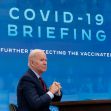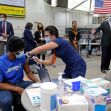The science is clear: The COVID-19 vaccines save lives. They are safe for mass use, and the more people who get their shot, the less likely additional variants will arise that might resist the vaccines. The rate of new vaccinations has slowed to a crawl, however, as certain populations around the country remain skeptical, if not downright opposed to the vaccine. While some states have enacted laws to encourage vaccination (such as limiting indoor dining to vaccinated patrons), other governors have actively fought against either public or private vaccine mandates.
To encourage vaccination and get around the obstinance of certain state governments, the Occupational Safety and Health Administration (OSHA) issued an Emergency Temporary Standard (ETS) implementing a vaccine mandate pushed by the Biden Administration. The OSHA ETS requires covered employers to enforce a vaccine requirement among employees.
The mandate is currently being challenged in the courts by states alleging the federal government exceeded its authority in passing this measure. While the case makes its way through the legal system, let’s take a look at what the vaccine mandate means for employers and employees.
The Basics: Vaccines By January 2022
OSHA’s ETS applies to employers around the country with 100 or more employees. Under the ETS, employers must ensure that all of their employees are vaccinated by January 4, 2022. Employees who have not received all of their shots must be tested for coronavirus at least once a week. Unvaccinated employees must wear face masks in the workplace.
OSHA and the White House have made it clear that the mandate explicitly preempts any state or local laws concerning vaccination, face coverings, and COVID-19 testing. State and local lawmakers can, however, enact additional restrictions that exceed the federal OSHA ETS requirements.
Employers Must Provide Paid Time Off
The OSHA ETS requires employers to provide paid time off for employees to get the vaccine and to recover from standard vaccine side effects. Employers must give “reasonable time” during work hours for employees to get the vaccine, which includes up to four hours of paid time, and they must offer a reasonable amount of paid sick leave for recovering from the vaccine side effects. OSHA presumes that offering up to two days of paid sick leave per primary vaccine dose is a “reasonable cap” on paid time off. Employers may, however, require workers to use accrued sick leave for their vaccine recovery time.
Employee Training and Education
The OSHA ETS also requires covered employers to provide employees with information about their policies implementing the mandate. Employers must provide employees with any new policies, explain things like how the employer will verify vaccination status and what paid leave is offered, as well as provide policies and procedures to follow in the event of a positive COVID-19 test. The ETS requires employers to inform employees about the efficacy and safety of the vaccines, the penalties for providing false statements, and employee rights concerning discrimination and retaliation.
Federal Court Puts Mandate On Hold
The mandate was set to go into effect on December 5 (aside from the weekly testing requirement, to take effect in January). The Court of Appeals for the Fifth Circuit, however, has blocked the Biden administration from enforcing the new mandate. The appeals court stated that the mandate was “fatally flawed” and cannot be enforced until a further judicial review has taken place. However, the fate of the mandate in the courts is far from sealed. Challenges to the mandate have been raised in courts across the country, and a lottery system for multi-district litigation last Tuesday handed the case to the Sixth Circuit Court of Appeals. This court (or the U.S. Supreme Court eventually) will ultimately rule on the legality of the vaccine mandate, meaning that the Fifth Circuit will not have the final say on the matter.






